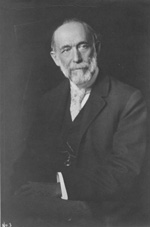- Thomas C. Platt
Infobox Officeholder
name = Thomas Collier Platt
imagesize = 170px
small
caption =
jr/sr = United States Senator
state =New York
term_start =March 4 ,1897
term_end =March 3 ,1909
predecessor =David B. Hill
successor =Elihu Root
jr/sr2 = United States Senator
state2 =New York
term_start2 =March 4 ,1881
term_end2 =May 16 ,1881
predecessor2 =Francis Kernan
successor2 =Warner Miller
birth_date =July 15 ,1833
birth_place =Owego, New York
death_date =March 6 ,1910
death_place = New York City, New York
constituency =
party = Republican
spouse =
profession =
education =
religion =
footnotes =Thomas Collier Platt (
July 15 ,1833 –March 6 ,1910 ) -- a two-term member of theU.S. House of Representatives (1873-1877) and a three-termU.S. Senator fromNew York in the years 1881 and 1897-1909 -- is best known for his contribution to the creation of the "City of Greater New York " which incorporated the four outer boroughs of Kings, Queens, Richmond and Bronx counties.Biography
Platt was born to William Platt, a lawyer, and Lesbia Hinchman in
Owego, New York on July 15, 1833. ["Platt, Thomas Collier." Grolier Encyclopedia of Knowledge, volume 15, copyright 1991. Grolier Inc., ISBN 0-7172-5300-7] His father, a successful attorney and strictPresbyterian , tried to encourage his son to enter the ministry. Accordingly, the young Platt was prepared for college at the Owego Academy and attendedYale College (1850-1852), where he studied theology at the behest of his father. But Thomas Platt had no interest in the ministry and failed to earn a degree. After leaving Yale in 1852, he entered into a variety of employments. He started out as a druggist (a business in which he was engaged for two decades), was briefly an editor of a small newspaper, served as president of the Tioga National Bank, and was interested in the lumbering business inMichigan . He also acted as president of the Southern Central and other railways. Platt was President of the Tennessee Coal & Iron Company for several years. In 1852 he married Ellen Lucy Barstow, with whom he had three sons.He was clerk of Tioga County from 1859 to 1861. He was elected as a Republican to the
Forty-third United States Congress and theForty-fourth United States Congress (March 4, 1873-March 3, 1877).He was elected as a Republican to the
United States Senate in 1881, and served from March 4, 1881, to May 16, 1881, when he andRoscoe Conkling resigned because of a disagreement with PresidentJames Garfield over federal appointments in New York . (Platt resigned at Conkling's insistence, earning him the nickname of "Me Too" Platt.) The immediate occasion of their resignation was the appointment of W. H. Robertson as collector of the port ofNew York City .New International Encyclopedia Due in part to the subsequent assassination of the President, their candidatature for election to the United States Senate to succeed themselves failed.He was the chairman of the Committee on Enrolled Bills (47th United States Congress|Forty-seventh Congress). Platt was secretary and director of the United States Express Co. in 1879 and elected president of the company in 1880. He was a member and president of the Board of Quarantine Commissioners of New York 1880-1888. He was a member of the
Republican National Committee and was elected to the United States Senate in 1896 and was reelected in 1902. Platt served from March 4, 1897, to March 3, 1909 and was not a candidate for reelection. He served as chairman of the Committee on Transportation Routes to the Seaboard (Fifty-fifth Congress). He was on the Committee on Printing (Fifty-sixth through Sixtieth Congresses), the Committee on Cuban Relations (Fifty-ninth Congress), the Committee on Interoceanic Canals (Fifty-ninth Congress).He died in New York City, March 6, 1910 and was interred in Evergeen Cemetery, Owego, N.Y.
Historical impact
On January 21, 1897, his photograph appeared in the "
New York Tribune " as “the firsthalftone reproduction to appear in a mass circulation daily paper,” according to Time-Life’s "Photojournalism".In order to increase his power as a
political boss , Platt steered passage of the Greater New York bill in 1898. The bill incorporated the boroughs ofBrooklyn ,Queens , andStaten Island into the city, thereby creatingNew York City as it exists today.Platt pushed for
Theodore Roosevelt to be on the 1900 Republican National ticket as PresidentWilliam McKinley 's vice presidential running-mate. Roosevelt played a major part in McKinley winning the re-election and he took over after McKinley was assassinated in office.References
Bibliography
* L. J. Lang (editor), "The Autobiography of Thomas Collier Platt", (New York, 1910)
* Dictionary of American Biography;
* [http://www.questia.com/PM.qst?a=o&d=9489049 Gosnell, Harold. "Boss Platt and His New York Machine: A Study of the Political Leadership of Thomas C. Platt, Theodore Roosevelt, and Others." (1924)] standard biography
* AMS Press, 1969; Platt, Thomas Collier. The Autobiography of Thomas Collier Platt. Edited by Louis J. Lang. 1910. Reprint. New York: Arno Press, 1974.
Wikimedia Foundation. 2010.
